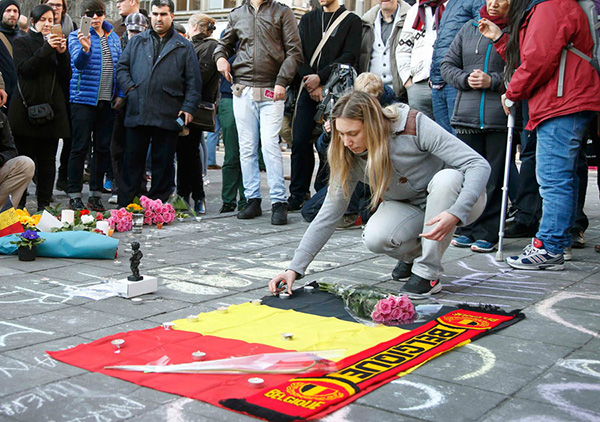A critical look into the rise of terrorism
Updated: 2016-03-30 07:57
By Chu Yin(China Daily)
|
||||||||
 |
|
People gather around a memorial in Brussels following bomb attacks in Brussels, Belgium, March 22, 2016. [Photo/Agencies] |
A powerful blast ripped through a park crowded with families in Lahore, Pakistan, on Sunday evening killing at least 70 and injuring more than 300. Many of the victims were women and children. The suicide attacker targeted members of the Christian minority community when they were celebrating Easter Sunday.
On the same day a pipe bomb detonated about 5 miles from Disneyland in California, causing damage to the walls of a shuttered business establishment, according to local authorities. Police said no injuries had been reported.
Lahore's blast has something to do with the continuing sectarian clashes in Pakistan, where religious disputes, even serious confrontations, are often reported. The United States, too, is no stranger to sporadic attempts to threaten its public security.
The two incidents seem to be part of the increasing number of extremists-led attacks, especially in the West. Only a week ago, the terrorist attacks in Brussels killed 35 people and left more than 260 injured (some of them critically).
But saying that no country is safe from terrorism may be going too far, and could easily spread unnecessary panic and fear. On the surface, these attacks are connected with the notorious Islamic State or the Taliban, but terrorism has begun to take shape in Europe from within, not the other way round. In other words, the surge in extremist activities and attacks that have taken a toll on Europe may not be new to many regional players.
On the other hand, there is an inherent tendency in Europe that suggests homegrown jihadists have become a major security threat because they have little to do with European civilization. But the fact is, they are basically European citizens (although many are first-generation immigrants) who have become the "standard-bearers" of "Islamic extremism".
These Islamic extremists are familiar with local social rules, adept at using Internet tools and have access to various financing channels. For them, Islam is just a convenient means of spreading terrorism, not spiritual inspiration in any sense, because what they are trying to do is challenge the mainstream ideology and order.
Some Muslims have been known to jump into parochial and sectarian clashes, which normally are driven by regional and tribal sentiments, and hence are less likely to mount coordinated and organized attacks in the face of strong local security arrangements.
The IS group's brutality and efficiency is the result of its capability to recruit ignorant or fanatical youths by offering them financial support. As such, the IS group has nothing to do with any Islamic creed or sect. As the Syrian civil war de-escalates, thanks to the US and Russia agreeing to endorse a cessation in hostilities in the country, more terrorists might be forced to travel back to Europe to wreak more havoc.
Against the backdrop of waning Western control over global and regional governance, bloodthirsty extremists may find it easier to fill the void and expand their turfs in some small, fringe countries in the Middle East. It is these already weakened countries, not European nations or the US, which will face bigger security threats, because to a point, they are the victims of the so-called Islamic terrorism that has emerged in the West.
The author is an associate professor at the University of International Relations.
- Global health entering new era: WHO chief
- Brazil's planning minister steps aside after recordings revelation
- Vietnam, US adopt joint statement on advancing comprehensive partnership
- European border closures 'inhumane': UN refugee agency
- Japan's foreign minister calls A-bombings extremely regrettable
- Fukushima impact unprecedented for oceans: US expert

 Stars of Lijiang River: Elderly brothers with white beards
Stars of Lijiang River: Elderly brothers with white beards
 Wealthy Chinese children paying money to learn British manners
Wealthy Chinese children paying money to learn British manners
 Military-style wedding: Fighter jets, grooms in dashing uniforms
Military-style wedding: Fighter jets, grooms in dashing uniforms
 Striking photos around the world: May 16 - May 22
Striking photos around the world: May 16 - May 22
 Robots help elderly in nursing home in east China
Robots help elderly in nursing home in east China
 Hanging in the air: Chongqing holds rescue drill
Hanging in the air: Chongqing holds rescue drill
 2.1-ton tofu finishes in two hours in central China
2.1-ton tofu finishes in two hours in central China
 Six things you may not know about Grain Buds
Six things you may not know about Grain Buds
Most Viewed
Editor's Picks

|

|

|

|

|

|
Today's Top News
Liang avoids jail in shooting death
China's finance minister addresses ratings downgrade
Duke alumni visit Chinese Embassy
Marriott unlikely to top Anbang offer for Starwood: Observers
Chinese biopharma debuts on Nasdaq
What ends Jeb Bush's White House hopes
Investigation for Nicolas's campaign
Will US-ASEAN meeting be good for region?
US Weekly

|

|









